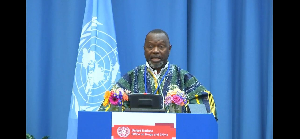Ghana’s Attorney General and Minister for Justice, Dr Dominic Akuritinga Ayine, took center stage at the 34th session of the Commission on Crime Prevention and Criminal Justice (CCPCJ), held in Vienna, Austria, from May 19–23, 2025.
Other members of Ghana’s delegation included Matilda Alomatu Osei-Agyeman, Ambassador and Permanent Representative to Austria and the United Nations, alongside officials from the Office of the Attorney General, Ministry of Justice, and the Embassy of Ghana in Vienna.
In a pivotal address under the theme, “Advancing sustainable, inclusive, science- and evidence-based solutions for the 2030 Agenda for Sustainable Development and its Sustainable Development Goals for leaving no one behind,” Dr Ayine reaffirmed Ghana’s dedication to the 2030 Agenda for Sustainable Development and the principle of “leaving no one behind.”
He detailed how Ghana is mainstreaming the SDGs into national policy, prioritising energy and education, and focusing on marginalised groups, including youth, persons with disabilities, and those in the northern regions.
Dr Ayine highlighted flagship initiatives such as the “Adwumawura,” a national apprenticeship program, and the “One Million Coders” project, both designed to equip youth with digital skills and foster entrepreneurship. These efforts, he emphasised, not only promote economic inclusion but also serve as preventive strategies against youth involvement in crime.
Regarding women, he projected the creation of the Women’s Development Bank and dedicated funding in the 2025 budget aimed at empowering female entrepreneurs.
Dr Ayine also emphasised Ghana’s increasing focus on environmental protection, calling for stronger international cooperation to combat environmental crimes.
Thematic discussions focused on addressing new, emerging, and evolving forms of crime, including crimes that affect the environment, smuggling of commercial goods, trafficking in cultural property, and other crimes targeting cultural property.
In a statement delivered on behalf of the Vienna-based African Group, Ambassador Matilda Alomatu Osei-Agyeman reaffirmed the continent’s commitment to the full implementation of the Kyoto Declaration and preparations for the 15th UN Congress on Crime Prevention and Criminal Justice. She stressed the need to address both the effects and root causes of transnational organized crime, linking crime prevention to sustainable development in line with Agenda 2030 and the African Union’s Agenda 2063.
On the margins of the CCPCJ, Dr Ayine held a meeting with the UNODC Executive Director, Ghada Waly. They focused on enhancing collaboration to combat corruption and strengthen criminal justice systems, discussing strategies such as leveraging technology, improving cross-border cooperation, and building capacity through partnerships, in line with UNODC’s priorities to address corruption, organized crime, and promote accountability and robust legal frameworks, particularly within African contexts.
Other bilateral meetings included those with officials from strategic countries and groups, such as Japan, the UK, the European Union, South Africa, and the USA, to enhance collaboration in the areas of crime prevention and criminal justice.
Ghana co-organised a strategic side event with the UNODC on enhancing good governance and the use of evidence in policymaking, presenting the evaluation of the Ghana National Anti-Corruption Action Plan (NACAP). Dr Ayine and Ambassador Osei-Agyeman shed light on Ghana’s experience in the fight against corruption.
Other side events that Ghana’s delegation actively participated in focused on the United Nations Convention Against Cybercrime, torture investigations and oversight, the Bangkok and Nelson Mandela Rules, and operational networks against links.
Ghana’s active participation, led by Attorney General and Minister for Justice Dr Ayine and the collective efforts of the African Group, underscored the importance of inclusive, evidence-based, and technology-driven approaches to crime prevention. As preparations begin for the 15th United Nations Congress on Crime Prevention and Criminal Justice, the outcomes of this session set the stage for deeper cooperation and stronger institutions worldwide.
Ghana remains steadfast in its commitment to peace, justice, and the rule of law, working hand-in-hand with the United Nations and the international community to build a safer, more just world for all.
The Commission on Crime Prevention and Criminal Justice, established by the United Nations Economic and Social Council, serves as the UN’s principal policymaking body on crime prevention and criminal justice. Its annual sessions foster dialogue, policy formulation, and the exchange of best practices among member states.



